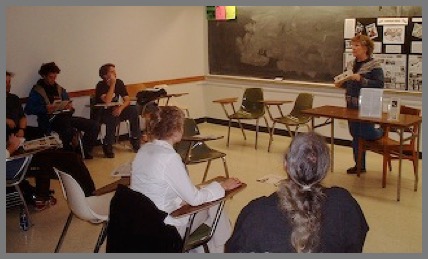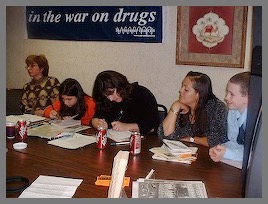Getting Started
Put any thoughts of timidity aside -- don’t worry about your lack of experience or focus. If you’ve never thought of yourself as 'an activist,' think of yourself as 'involved citizen.' We want you to realize that as an individual you can educate thousands of people in your community.
Action doesn’t require experience, but I'll ask you to choose some tasks to begin right away that'll help your imagination begin influencing anyone you meet.
A process begins with one step
Leave a flyer, leaflet or tabloid in public where possible and appropriate. Look for public and private places with reading racks and make a regular route to replenish the rack with literature: Laundromats, church reception areas, libraries, auto repair waiting rooms, beauty and barber shops, bookstores, and cafés. Get permission when and where necessary.
Visit defense attorneys who handle drug cases and ask permission to keep a supply of literature replenished in their reception areas. Contact doctors and local heath care providers; they have waiting rooms, too.
Enclose a flyer or leaflet with your business and personal correspondence. People read an 8" x 11" sheet of paper more often than they’ll read a brochure.
Wear a slogan T-shirt, hat or other item of clothing. Keep www.november.org prominent if you have your own website, or personal networking website on the internet.
Recognizable, visible images grow public awareness. Sometimes they provoke great conversations, too. Carry a few flyers with you, especially when you’re wearing a slogan!
Write a letter to the editor of your local newspaper about the drug war and its detrimental effect on society.
Family members or friends create online forums on Facebook, Blogger, to name just a few. People can create video shorts on their personal computers. YouTube’s a great place to get your message out in creative ways — and it’s free!
Meet with other like-minded people first. Begin to bring people in your family, neighborhood, and community together for informal discussions. Arrange to use an available public or private meeting space and watch a video documentary together. Bottom’s Up will explain how to organize these events step by step, even suggesting current and classic educational media.
Speak up! Let your opinions be known. Prisoners can write radio stations, and community radio stations in your listening area are likely to take up your issue. People not imprisoned can call radio and television news stations and everyone can write a traditional letter to the local news editor -- some can send it by email.

Journey for Justice: Madison, WI 2003
Take an informational display to a college, or offer to give a presentation at a public forum. Civic groups gather weekly and monthly and are always looking for speakers for routine meetings. We can help you prepare with materials from our home office, and teach you the process. Sometimes it’s the personalized display that achieves more local impact. You'll find the 'tools' to make one in Bottoms Up.
Find out who is working on issues of social justice in your community. To introduce yourself, you might consider calling them, and make a lunch appointment (if you can afford to pick up the tab). If you can't afford lunch, call and let them know that you’d like to have a meeting. Imprisoned people can write letters to clergy, journalists, and advocates in communities near the prison or jail. While they might not become a regular visitor, they will be a regular listener and may open a conversation with you, and take your thoughts and concerns to others.
Research the newspaper reporters. Who covers criminal and social justice issues? How do they write about the drug war? Try to make personal contact with reporters, and let them know you are a community activist working on drug law reform.
Make a directory of local television network affiliates and national network addresses. Keep pre-stamped postcards handy. When a show covers drug abuse, repeats untruthful government propaganda, or airs a fair and comprehensive segment or series, jot down the station, program name, scene, and date. Write a short, polite message to the appropriate network at the next station break. Thank them for a good story––or expose the lies. Remember to ask them to visit www.november.org for more information.

Journey for Justice: Durham, NC 2002
Set aside at least part of one day each week to write your local, state and federal elected officials and newspaper and magazine editors. It may feel futile, but with public dissent rapidly mounting, personal letters become more important. Ask friends and family members to join you.
When a legislator responds, answer the letter. If s/he does not address your concerns adequately, pose the concerns again. If you get a positive response, thank the lawmaker in reply. To find your elected representatives, enter your zip code at www.vote-smart.org. You can also send a self-addressed stamped envelope to city hall and ask them to provide the information you seek.
Invite friends and family members over for a dessert potluck and letter-writing party! Together, compose a letter that gets approved and signed; present it with your contact information. Legislators will respond and share their views. Figuring out where your elected leaders stand is done easily by writing them. Studying convoluted voting records is harder than writing them monthly about drug war issues.
Watch for hearings and meetings that propose new prisons or jails, or “new” sentencing laws and policing matters. Attend meeting or hearings to voice opposition to more prisons, harsher sentencing laws, or ineffective policing. Sometimes these meetings are appropriate gatherings for local activists to wear their slogan T-shirts and distribute literature.
Now for some details!
Put any thoughts of timidity aside -- don’t worry about your lack of experience or focus. If you’ve never thought of yourself as 'an activist,' think of yourself as 'involved citizen.' We want you to realize that as an individual you can educate thousands of people in your community.
Action doesn’t require experience, but I'll ask you to choose some tasks to begin right away that'll help your imagination begin influencing anyone you meet.
A process begins with one step
Leave a flyer, leaflet or tabloid in public where possible and appropriate. Look for public and private places with reading racks and make a regular route to replenish the rack with literature: Laundromats, church reception areas, libraries, auto repair waiting rooms, beauty and barber shops, bookstores, and cafés. Get permission when and where necessary.
Visit defense attorneys who handle drug cases and ask permission to keep a supply of literature replenished in their reception areas. Contact doctors and local heath care providers; they have waiting rooms, too.
Enclose a flyer or leaflet with your business and personal correspondence. People read an 8" x 11" sheet of paper more often than they’ll read a brochure.
Wear a slogan T-shirt, hat or other item of clothing. Keep www.november.org prominent if you have your own website, or personal networking website on the internet.
Recognizable, visible images grow public awareness. Sometimes they provoke great conversations, too. Carry a few flyers with you, especially when you’re wearing a slogan!
Write a letter to the editor of your local newspaper about the drug war and its detrimental effect on society.
Family members or friends create online forums on Facebook, Blogger, to name just a few. People can create video shorts on their personal computers. YouTube’s a great place to get your message out in creative ways — and it’s free!
Meet with other like-minded people first. Begin to bring people in your family, neighborhood, and community together for informal discussions. Arrange to use an available public or private meeting space and watch a video documentary together. Bottom’s Up will explain how to organize these events step by step, even suggesting current and classic educational media.
Speak up! Let your opinions be known. Prisoners can write radio stations, and community radio stations in your listening area are likely to take up your issue. People not imprisoned can call radio and television news stations and everyone can write a traditional letter to the local news editor -- some can send it by email.

Journey for Justice: Madison, WI 2003
Find out who is working on issues of social justice in your community. To introduce yourself, you might consider calling them, and make a lunch appointment (if you can afford to pick up the tab). If you can't afford lunch, call and let them know that you’d like to have a meeting. Imprisoned people can write letters to clergy, journalists, and advocates in communities near the prison or jail. While they might not become a regular visitor, they will be a regular listener and may open a conversation with you, and take your thoughts and concerns to others.
Research the newspaper reporters. Who covers criminal and social justice issues? How do they write about the drug war? Try to make personal contact with reporters, and let them know you are a community activist working on drug law reform.
Make a directory of local television network affiliates and national network addresses. Keep pre-stamped postcards handy. When a show covers drug abuse, repeats untruthful government propaganda, or airs a fair and comprehensive segment or series, jot down the station, program name, scene, and date. Write a short, polite message to the appropriate network at the next station break. Thank them for a good story––or expose the lies. Remember to ask them to visit www.november.org for more information.

Journey for Justice: Durham, NC 2002
When a legislator responds, answer the letter. If s/he does not address your concerns adequately, pose the concerns again. If you get a positive response, thank the lawmaker in reply. To find your elected representatives, enter your zip code at www.vote-smart.org. You can also send a self-addressed stamped envelope to city hall and ask them to provide the information you seek.
Invite friends and family members over for a dessert potluck and letter-writing party! Together, compose a letter that gets approved and signed; present it with your contact information. Legislators will respond and share their views. Figuring out where your elected leaders stand is done easily by writing them. Studying convoluted voting records is harder than writing them monthly about drug war issues.
Watch for hearings and meetings that propose new prisons or jails, or “new” sentencing laws and policing matters. Attend meeting or hearings to voice opposition to more prisons, harsher sentencing laws, or ineffective policing. Sometimes these meetings are appropriate gatherings for local activists to wear their slogan T-shirts and distribute literature.
Now for some details!